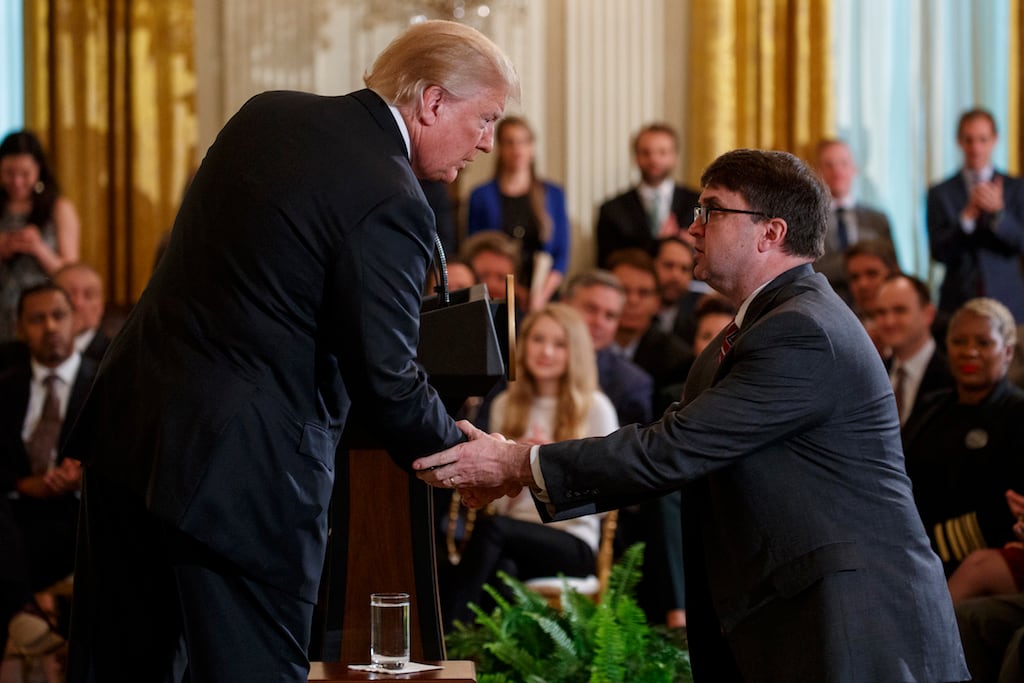WASHINGTON — Now that President Donald Trump has announced Robert Wilkie as his pick for the next permanent secretary of Veterans Affairs, the immediate leadership question facing the department is who the next acting VA secretary will be.
On Friday, during an unrelated event at the White House, President Donald Trump announced that he would tap Wilkie — the department’s interim head for the last 51 days — for the vacant Cabinet post. The timing of the announcement seemed to shock Wilkie, who had been among a short list of candidates for the post.
Wilkie has received generally positive reviews from veterans groups for his work in the acting secretary role so far. But under federal statute, that stint must end once he is formally nominated for the permanent role.
Under existing rules, individuals can’t serve in an acting role for a Senate confirmable executive branch post unless they had previously been the first assistant to that office for 90 days.
RELATED

New Central Intelligence Agency Director Gina Haspel served as acting agency chief while going through the Senate confirmation process. But she had served as deputy director of the agency before her nomination in March.
Wilkie, in contrast, was not even a VA appointee before he took over the acting job in March. He has been serving as the Defense Department’s under secretary for personnel and readiness since last fall.
VA officials referred all questions on their department’s leadership change to the White House. White House officials did not respond to requests for comment.
Critics said the shocking timing of Wilkie’s nomination and subsequent uncertainty about the department’s chain of command only adds to the ongoing instability of the embattled agency.
“It is abundantly clear that Robert Wilkie cannot be nominated to be VA secretary while serving as acting secretary,” said Will Fischer, director of Government Relations of VoteVets.
“Once again, this president just made a spur-of-the-moment decision on veterans care, without any consideration, without any thought, and clearly without the usual process, which would have caught this issue with the law.”
VoteVets is already part of a lawsuit against Trump over Wilkie’s interim appointment to VA, which they argue violated the Federal Vacancies Reform Act.
RELATED

When former VA Secretary David Shulkin was forced out of office by Trump in March, administration officials said it was officially a resignation by the once-popular veterans executive. Shulkin said he was fired and never offered a resignation letter.
Under existing law, the president can appoint whomever he wants to fill an open high-level executive branch post in cases of death, incapacity or resignation. The VoteVets lawsuit argues none of those happened with Shulkin, and the department’s top deputy — Thomas Bowman — should have been appointed acting secretary instead.
Bowman in recent months has fought with White House officials over a host of policy issues, including how much veterans medical care should take place outside the VA hospital system.
Now, with Wilkie apparently close to vacating the acting secretary post, the question becomes whether the Trump administration will again bypass Bowman in favor of a different acting secretary.
“It looks like, once again, President Trump decided not to talk to his lawyers before making a major announcement,” said Anne Harkavy, executive director of Democracy Forward, which is party to the VoteVets lawsuit.
“Trump’s off-the-cuff approach demonstrates how little regard he and his administration have for the interests of America’s veterans, and only creates additional uncertainty about whether and how veterans will continue to receive the benefits they’ve earned.”
Since becoming a Cabinet-level department in 1989, VA has only has four acting secretaries and never two consecutive interim leaders.
Senate officials have not announced when confirmation hearings for Wilkie may take place, because Wilkie has not yet been formally nominated by the White House. Once that happens, lawmakers usually act on the nomination within a month or two, although partisan fighting in the Senate over the last 16 months has slowed much of that process.
Leo covers Congress, Veterans Affairs and the White House for Military Times. He has covered Washington, D.C. since 2004, focusing on military personnel and veterans policies. His work has earned numerous honors, including a 2009 Polk award, a 2010 National Headliner Award, the IAVA Leadership in Journalism award and the VFW News Media award.





